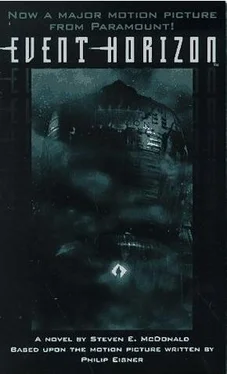Hollis slammed a hand down on the desk, making Lyle jump. “That doesn’t mean a damn thing.” Hollis reined his temper in, calming himself. Never a good idea to blow a fuse in front of junior staff. He continued in a more reasonable tone. “They wanted a scapegoat, and Weir’s an easy target. He’s not responsible for what happened.”
“Does he know that?”
Hollis raised his eyebrows, surprised at the tone of concern in Lyle’s voice. “What’s on your mind?”
“He doesn’t belong on this mission,” Lyle said firmly. She did not flinch away from Hollis’ unwavering stare. Hollis had to give her credit for her willingness to take a flag officer on in an argument. “Responsible or not, he blames himself. He’s too close to it,”
Lyle paused and Hollis waited. His aide had yet to conclude the argument.
Hollis was not about to make it easier for the adjutant—better for everyone if Lyle got everything shaken out now.
Hollis inclined his head.
Lyle licked her lips, swallowed. “And then there’s his wife.”
There it was. God knows we’ve all wondered about Bill’s mental state, he thought. “It’s been two years since she died.”
“Some things you don’t get over,” Lyle said, her tone flat.
Hollis glanced involuntarily at his ring finger. He had to concede that point, if only because some people were unlikely to get over certain kinds of emotional trauma. He had seen William Weir on his knees while the gates of Hell swung open before him. Perhaps this was Weir’s chance for redemption. The man could use some serious recovery.
“Bill Weir is the best chance we have at recovering the ship,” Hollis said, and this time his tone brooked no further argument from Lyle. “He’s going. I want our best people on this.”
Lyle nodded, moving smoothly back to business at hand, the tension sloughing away like water off a duck’s back. “The Lewis and Clark just returned from patrol in the asteroid belt. She’s docked in Bay Four.”
Hollis hated to do this to a hard-worked crew that was due for some downtime and R&R, but he had no choice. If Lyle was pointing to the Lewis and Clark rather than an overhauled ship with a rested crew, then there was no other ship within reasonable distance of Daylight Station.
The Lewis and Clark had a crack USAC crew, one that was used to the pressure and knew how to take orders. They would deal with it. Hollis could trust their captain to keep them in line.
“Tell Miller to round up his crew,” he told Lyle. “They’re going back out.”
The hull of the Lewis and Clark did a good job of reflecting the state of its crew. The ship was badly in need of a full overhaul, perhaps even a partial refit, after long-haul duty out in the Big Rock Range. Asteroid belt patrol duty offered little in the way of rewards and a great deal in the way of hazards and ship wear.
The Lewis and Clark had been peppered with micrometeorites and feathered with dust motes that chewed into the metal as she sailed her way through the gulfs between Mars and Jupiter. She was well known to the Belters, the determined asteroid miners who dug their living out of the rock; for more than a few the Lewis and Clark was a lifesaver.
The Lewis and Clark was not a pretty ship. Her builders had essentially taken an enormous ion drive and built a spaceship around it, making a place for instrumentation and, grudgingly, for a small crew, a configuration that one British wag had proclaimed to her captain, Miller, as being “All arse and no fore’ead.” A muscleship with armor that would make a cockroach cheer, she could stand up to almost anything short of a high-speed encounter with a big chunk of
rock. She could easily deal with a no-maintenance turnaround and another run, this one taking them much further than the Big Rock Range.
Inside, she was no great comfort. Captain Miller, poised loosely in his con as he tried to remain relaxed, looked down on his demesne. Behind thick quartz windows in the nose, the bridge was a compacted nightmare of instruments on two horseshoe levels. Operator’s chairs seemed to have been wedged into the best available positions that might still allow some movement, suggesting that the human component had been the last consideration here.
Two of those human components were packed too closely together at the front of the bridge. There was enough elbow room, but the feeling on these boats was that you had better maintain a friendship prayer on a long haul, or someone was surely going to get mauled, maimed, or murdered.
Starck sat to the left, focused on her navigational readouts, running cool but intense. She was on this crew because Miller had wanted her on this crew, and he had had enough clout somewhere to get away with demanding that she be assigned to the Lewis and Clark. Her hair was pulled back, pinned severely in place, giving her angular face the look of a professional ascetic.
Smith sat to her right,- hunched over his console. Starck glanced aside at the pilot, who was fluttering his hands over keypads, laying hi their course as he read it from her navigational feed to his console. Where she was slim and sharp, Smith was somehow blocky, cropped where she was trim, an abrupt, stiff man. A good pilot, Miller thought, but a lousy diplomat. Fortunately, Smith’s scraps with Belters were few and far between, and someone usually got in between quickly enough to prevent anyone from getting damaged.
Suddenly done with his work, Smith straightened, rubbed at his face, and sat back abruptly, making his pilot’s chair wobble gently on its gimbal mount.
He heaved a sigh.
Miller, looking down, sympathized.
Smith tilted his head back, looking up at the Captain’s position. “I can’t believe this. I haven’t gotten more than my hand in six weeks, and now this shit.” Miller saw Starck purse her lips at Smith’s remark. Smith liked to needle the navigator. “Why not Mars, Captain? Mars has women.”
Starck looked around and up now, her dark eyes guileless. “Smith’s right.”
Miller could tell what she was thinking there: isn’t that unusual? As much as Smith liked to needle her, she liked to needle right back. “Neptune? There’s nothing out there.”
“If the shit goes down, we’ll be on our own,” Smith said. The pilot had a look of deep concern. Miller could not blame him for his feelings on the matter either. It was going to be goddamned lonely out there.
Miller tapped a switch on the main operations panel of his chair and was swiveled around and lowered into the center of the bridge. He appreciated the visual effect of this setup, although he could not see it-for himself. He was not a small man by far; he might have done well if he had pursued football seriously, but he had chosen not to give in to the hints and coercion in high school, preferring instead to pour the contents of book after book into his brain. The net result of that was that he could not only strike terror into the hearts of those he wished to terrify, he knew enough in the way of psychology and strategy that he could have them running errands and doing his laundry.
Coming down from the con had the effect of Zeus coming down from Olympus.
Miller cultivated an intense, brooding look and a watchful air, the image of the dedicated warrior. He was not a particularly handsome man, but he kept and carried himself well. Belters tended to appreciate him for his no-nonsense approach, and a few even welcomed his dark presence.
As the chair locked in place, Miller said, “You know the rules. We get the call, we go. Is the course locked in?”
“Locked and cocked,” Smith said. The pilot turned back to his station, his back tensing up. Does he ever relax? Miller wondered. One of these days Smith was just going to explode on the spot.
Читать дальше












